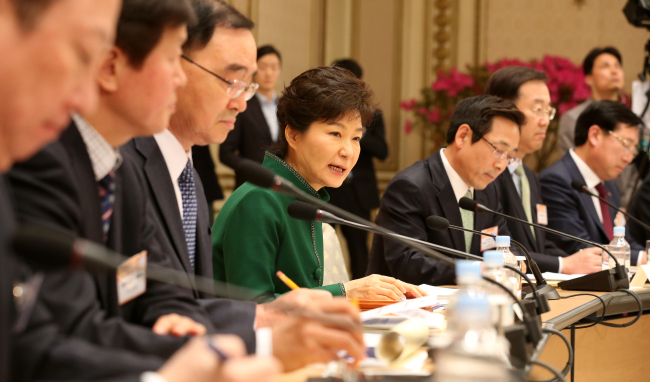 |
President Park speaks during a nationally televised meeting with regulators and businesses. (Yonhap) |
President Park Geun-hye championed deregulation as the best way to revitalize South Korea's economy and create jobs Thursday as she held a nationally televised meeting with regulators and businesses to show how much she is determined to undo non-essential regulations she denounces as "cancer."
It is very rare for a presidential meeting to be broadcast on live TV from beginning to end, and the unusual setting was designed to send a strong message directly to the public and, more importantly, to bureaucrats handling regulations that Park will go after unnecessary business restrictions until the end.
"The reason I am putting the focus on deregulation rather than on anything else is because it means job creation," Park said in an opening speech at the meeting. "I believe that deregulation is the only key we can use without any cost to innovate the economy and make it leap forward.
Recalling a warning from a foreign economic consulting firm that without sweeping reforms, South Korea's economy would go into free fall, Park said that deregulation would provide such "extraordinary reform measures" necessary to keep the economy afloat.
She also urged bureaucrats to be more proactive in removing or relaxing regulations, saying the performance evaluation system for government officials should be thoroughly overhauled to reflect how actively they worked on deregulation.
"Ministries and officials with excellent performances in deregulation should be given exceptional incentives while those who give people a hard time (with regulations) should be held accountable," Park said.
The ministerial meeting on regulatory reform had originally been scheduled for Monday but was put off at the last minute after Park balked at the original setting that included only a handful of businesspeople, with the rest being government officials.
Park ordered that the meeting be redesigned to include more businesspeople and make it open-ended, saying she wants to use the session to listen to what businesses have to say about regulations and to demonstrate the government's commitment to deregulation.
About 60 out of a total of some 160 participants in Thursday's meeting were from businesses. They included not only those from the country's major business organizations, but also small neighborhood shop owners, officials said.
They raised a wave of complaints about difficulties they face while doing business due to unreasonable regulations. The meeting, which began at 2 p.m., was to close at 6 p.m. but can be extended if needed, officials said.
During the meeting, the government reported that it will cut the total number of registered regulations on business activity to 80 percent of the current level by 2016. That translates into the removal of 2,200 regulations and a drop in the total from 15,269 to 13,069.
The government also reported it will adopt Britain's "regulation cap" system to keep steady the total cost of regulations borne by businesses and the public. The system calls for removing old regulations to make room for new ones.
It will first be tested by seven ministries, including the Ministry of Land, Infrastructure and Transport, starting July, before being expanded across the government starting in January next year.
Park has made deregulation the most important point in her drive to reinvigorate Asia's fourth-largest economy under her three-year economic innovation plan. The plan calls for raising South Korea's potential growth rate to around 4 percent and the per capita national income to more than $30,000 by 2017.
She believes that investments are the key to speeding up South Korea's slow economic recovery, and lifting or easing all but core regulations will spur fresh investments and lead to the creation of more jobs.
Deregulation is also important in realizing Park's "creative economy" vision that calls for boosting the economy by turning creative ideas into real businesses through science and technology and information technology.
Park has repeatedly stressed the importance of deregulation and how much she is committed to it, with the language and tone in her appeals growing increasingly stronger in a sign of frustration she feels about the lack of progress and the difficulty getting bureaucrats to remove regulations.
Earlier this month, Park branded unnecessary business restrictions as "our archenemy to smash up" and a "lump of cancer killing our body." The language was so strong that it even smacked of North Korean propaganda.
Thursday's meeting was comprised of two smaller sessions.
In Session 1, some 20 participants from businesses talked about difficulties and hardships they face because of unnecessary regulations, and related ministers were to speak in response about how they will reform such restrictions.
The second session was to be devoted to studying cases of success and failure of regulatory reform, and experts will talk about how such reform should be carried out depending on five major sectors in the services industry.
British Ambassador Scott Wightman has also been invited to speak at the meeting about the country's "regulation cap" system, officials said. (Yonhap)








